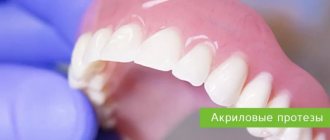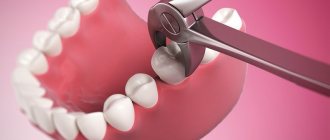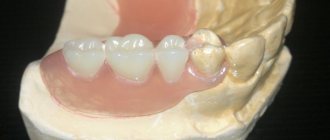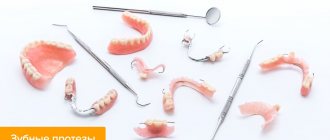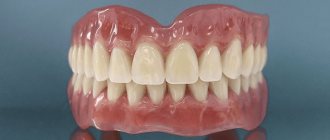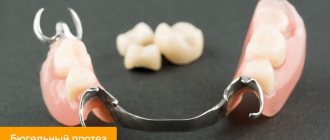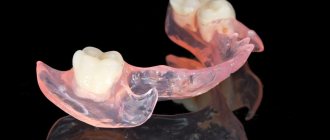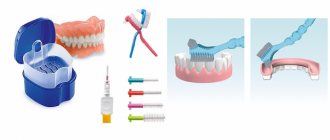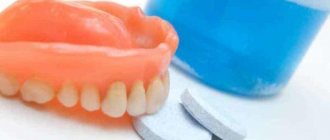Completely removable dentures are used for prosthetics of jaws that are completely devoid of teeth (in the case of edentia). The prosthesis is held on the jaw due to its tight fit to the tissues of the prosthetic bed. If we are talking about a prosthesis for the upper jaw, then high-quality fixation can be achieved through a special valve that creates negative pressure, that is, in essence, the prosthesis is held in place by vacuum. Traditionally, dentures for the lower jaw are very uncomfortable, this is due to poor conditions for their reliable fixation. Specially developed adhesive pastes and creams can help keep the prosthesis in place; they significantly improve the retention (fit) of the structure. Often, such dentures are made of acrylic plastic, with the help of special dyes, it is given the color and shade of the patient’s gums so that it does not stand out against the background of the oral cavity, and artificial teeth are mounted into it, which exactly imitate a person’s normal bite.
The process of getting used to dentures (full or partial) is often long and difficult
Thanks to such products, patients can enjoy life again, eat whatever they want (and even what they could not afford before), since chewing function is completely restored. Without the use of this type of prosthesis, you can forget about normal trips to catering establishments or family feasts, since such a person will not be able to afford anything other than yogurt or puree.
But the question arises - how to get used to dentures ? The process of getting used to removable dentures is very long and often difficult. Such prosthetics cannot be called a complete procedure, since the oral mucosa is constantly irritated, and the patient himself experiences discomfort.
What problems may arise after installing a denture?
Adaptation to a removable denture begins almost immediately after installation is completed in the dentist's office. And, according to statistics, almost every patient experiences certain difficulties that are associated with the adaptation period. Here are some of them:
- Vomiting reflex . Constant vomiting is a completely normal reaction of the body to a foreign object in the oral cavity, so there is no need to worry too much about this. But there is a category of people who take the longest to get used to dentures, or who don’t get used to them at all. The installation of products that stick to the sky is contraindicated for them. This must be taken into account when choosing a prosthetic method. Often, this problem goes away on its own. But for patients with hypersensitivity, it is better to abandon such structures altogether.
- Profuse salivation . The human body perceives the prosthesis as food, as a result of which the brain sends signals that then activate the corresponding functions, namely the secretion of saliva and gastric juice.
- Unpleasant sensations while eating . First of all, this problem affects the owners of removable dentures; the load is unevenly distributed across the jaw, in contrast to the natural chewing of food with real teeth. It takes a long time to get used to this.
- Perception of taste . You may partially lose your sense of taste, since not only the tongue (as many believe), but also the rest of the oral cavity is involved in its perception. The patient may stop feeling spicy, salty, hot or sweet foods; this process occurs differently for everyone.
- Distortion of speech . The prosthesis and its protruding parts can interfere with the tongue; a person with an installed prosthesis has difficulty pronouncing words. But after some time (about a week), diction returns to normal.
Fact No. 3: new generation acrylic structures are quite easy to use
Until recently, acrylic dentures were considered obsolete due to the shortcomings of the acrylic component. But reviews from patients and professional doctors suggest that acrylic has been improved and refined over recent years, thanks to which products made from it have an increased level of comfort and an optimal price-quality ratio.
For example, innovative clinics today create new-generation acrylic dentures in their own dental laboratories. Diamond chips are added to the material, due to which it acquires new positive properties: it becomes less porous, smoother and softer, comfortable and natural-looking. This material accumulates significantly less bacterial plaque (compared to classic porous acrylic); it retains its color, shine and original shade longer. When wearing such devices in a patient who carefully observes oral hygiene, the risk of developing inflammatory processes in the mucous membrane is minimized.
New generation designs are quite easy to use
Also today, orthopedic structures made from improved monomer-free acrylic plastics, for example, Acry Free, are also actively used for dental restoration. Products based on acrylic resins, compared to products made from pure acrylic, are more flexible and lightweight, up to 20 times stronger (not as fragile as acrylic), hypoallergenic (biologically inert), and non-toxic. Moreover, acrylic removable dentures "Acry Free", according to recent studies, reduce the time of adaptation to removable systems by 30-35 days, and slow down the process of jaw bone atrophy by 1.5 times2.
Read on the topic: the differences between the classic acrylic and the Acry Free prosthesis.
Useful tips for those who have recently installed a prosthesis
Literally from the first days of using a prosthesis, many patients complain of pain, as well as abrasions and scratches in the oral cavity. In fact, mechanical damage should not occur, since this point was thought out at the product design stage. Perhaps you are simply wearing it incorrectly. If the problem does not resolve itself, you need to contact your dentist for further adjustments to the prosthesis.
The tips given below will not completely relieve you of difficulties during the adaptation period, but they will significantly reduce the level of negative impact and will help you get used to the prosthesis faster.
The process of chewing food causes pain, so in the first few weeks it is better to protect yourself from eating solid and tough foods: meat, nuts, cookies, etc. If even soft food is painful to chew, then at first you can cut it into small pieces. Trust your feelings, and when the pain begins to subside, gradually move on to your usual, normal diet.
Under no circumstances should you reduce the number of meals. Most patients, due to a strong fear of getting damage to the oral cavity (and they take a very long time to heal), switch to liquid foods and yoghurts. But this is not the right solution, since in order to get used to the prosthesis, a constant chewing load is needed.
Foods such as pears, apples and citrus fruits should be cut into small pieces and chewed slowly, with great effort. This allows you to reduce the degree of damage to the mucous membrane, and also gives the body all the necessary vitamins.
If you have a dry mouth or increased salivation, it is recommended to drink plenty of liquid in small sips throughout the day.
If you feel slight numbness, you can do a light massage of the gums, this will improve blood circulation and the numbness will go away in just a few minutes. In this case, you need to remove the prosthesis.
Decoctions of herbs such as sage and chamomile will help strengthen your gums and prevent irritation. It is advisable to carry out the procedure three times a day. The decoction should never be hot; liquid at room temperature is the best option.
Patient reviews
“I got acrylic teeth because... I was seduced by the price of them, but now I regret it. It is very difficult to get used to them, almost impossible, everything constantly rubs and hurts. The doctor said that they have a short service life, about 5 years, but I couldn’t even stand two years…”
Anzhelika Mikhailovna, review from otzovik.com
“I have these, and I can say that they are not only budget-friendly, but also very comfortable. I've heard a lot of negative things about them, but I think it all depends on the specialist who made them. My orthopedist and technician are amazing people, with waiting lists for appointments six months in advance. From here I draw the conclusion that it’s not the material, but the quality of the design.”
Saburov D.V., review of the site 32top.ru
“I was embarrassed by the bad reviews about these prostheses, so in the end I settled on nylon ones, but they also turned out to be uncomfortable. Now I’m wondering whether it’s worth choosing removable dentures again or whether it’s time to save up for implantation.”
Olesya, from correspondence on the woman.ru forum
“I encountered wearing acrylic only when a fixed prosthesis was made on implants. I didn’t notice any shortcomings, because, firstly, the prosthesis was installed 2 days after the installation of the implants. It completely covered my gums, which were in poor condition after periodontitis, and by the way, there was no need for plastic surgery. Secondly, it was nice that I started eating normal food almost immediately (after about three weeks). And yet, in my acrylic prosthesis there was some kind of metal beam, very strong, it did not allow, as the doctor said, only the installed implants to move. And what’s more, I wore the dentures not for six months, but for about a year and a half, and only then I went to change them. It's very profitable. In general, my experience was only successful.”
S.Mona, review from the dental forum gidpozubam.ru
Notice
: Undefined variable: post_id in
/home/c/ch75405/public_html/wp-content/themes/UltraSmile/single-item.php
on line
45 Notice
: Undefined variable: full in
/home/c/ch75405/public_html/wp-content /themes/UltraSmile/single-item.php
on line
46
Rate this article:
( 4 ratings, average: 4.75 out of 5)
prosthetics
- Sokolovskaya V.M., Nidzelsky M.Ya., Dudchenko N.A. The effect of acrylic plastics on the oral mucosa. Journal “Dermatovenereology. Cosmetology. Sexopathology", 2015.
- Sadykov M.I., Nugumanov A.G. Comparative assessment of prosthetics for patients with complete removable acrylic dentures. Siberian Medical Journal (Irkutsk), 2012.
Expert “If the dental laboratory of the clinic you contact employs qualified and experienced technicians and also purchases high-quality material, then the likelihood of developing an allergy to acrylic is minimized. It often happens that when creating a prosthesis, technicians use the wrong ratio of materials and violate their processing technology, as a result of which the quality of the product suffers. I recommend choosing a clinic with a good reputation, where they will make you inexpensive but comfortable dentures from high-quality materials. Modern technologies make it possible to make even a material such as acrylic as safe as possible for use.” Orthopedic dentist Sambuev Bair Sergeevich
Consulting specialist
Sambuev Bair Sergeevich
Specialization: Orthopedic dentist Experience: 11 years
Accelerate the process of getting used to the prosthesis
- Rinse your mouth with a salt solution;
- Take the process of cleaning your denture seriously;
- Try sucking on lollipops, this process calms you down and distracts you from having a foreign object in your mouth;
- To improve your diction, say tongue twisters, read aloud, and speak more often. It’s also worth trying to pronounce words louder. Often, normal speech is restored within a few weeks;
- For a more reliable fixation of the prosthesis in the oral cavity, it is best to use special gels and ointments; they not only allow you to securely fix the product in the mouth, but also prevent the appearance of abrasion wounds and other mechanical damage to the oral cavity.
- It is necessary to completely exclude various sticky foods from the diet, and not only for the period of getting used to the prosthesis. These can be candies, various chocolate bars with nougat, toffees, etc.), they can not only cause discomfort during chewing, but also damage the structure.
Is it easy to get used to?
This aspect is one of the most exciting. Very often, in addition to installation, patients are also afraid of discomfort and changes in diction. No one wants to have many speech impediments that would immediately hint at the presence of removable dentures.
Nylon structures are much easier to get used to because of their softness and flexibility, but even they take some time to become part of the jaw and not cause any discomfort when chewing and speaking.
To quickly get used to it and regain normal abilities to chew and talk, you should train a little. It is better to start eating with small pieces and choose soft food. Large pieces should be cut into smaller ones and chewed very carefully. To restore speech, reading aloud is suitable. Pronounce the words carefully and over time normal diction will return. The main thing is not to worry and be prepared for some inconveniences. In just a little time, you will be able to use your new teeth calmly and comfortably, and those around you will not even realize that you have a prosthesis.
What to do if the addiction is seriously delayed?
If, over a fairly long period of time, you cannot get used to the prosthesis (that is, to a foreign body in the mouth), then there may be several logical explanations for this problem:
- Jaw atrophy;
- Individual characteristics of the jaw structure of a particular patient;
- Poor fixation of the structure;
The most difficult thing to get used to is the so-called clasp structures, which are based on fastenings made of metal. In addition to mechanical effects, exposed metal parts can also have chemical effects, reacting with the acidic environment of the oral cavity. It is simply impossible to correct such a product on your own, as it is easily damaged. Therefore, if you have the feeling that such a design is rather poorly and unreliably fixed in your mouth, it is better to go to a specialist. If the mobility of the prosthesis inside the oral cavity is due to jaw atrophy, a special ointment for additional fixation can help you.
Repair and correction of defects
Many patients are very interested in this particular question, because dentures are not cheap. Repairing removable structures is quite possible if the crowns, that is, artificial teeth, are damaged.
If damage occurs on the base, then unfortunately the entire prosthesis will have to be replaced. Minor imperfections that appear on crowns can be corrected using special materials. The base is made as one piece at a time. If a removable denture breaks, it will have to be replaced with a new one.
Terms of adaptation
For some, the feeling of discomfort passes quite quickly; for others, the adaptation process is inevitably associated with prolonged physical suffering.
Talking about exact dates is quite problematic, because quite a few factors play a role here. For example, the condition of the patient’s gums at the time of installation of the prosthesis. Severely damaged gums will begin to actively rub against the surface of the product, this will cause even greater irritation. In this case, the adaptation process will drag on for several months. The period of adaptation increases significantly when installing clasp dentures; this type of construction has many metal parts that easily damage the soft tissues of the oral cavity.
Psychological state is an important factor in the process of getting used to dentures. A person who experiences stress, is constantly nervous and tries to remove the prosthesis at the first opportunity, himself prolongs the adaptation period, and quite significantly.
If we talk about averages, then for most patients the adaptation period takes approximately two (2) weeks . The reasons listed above can guarantee to increase the period of adaptation to several months.
Stock
-9%
BASAL COMPLEX - Restoration of teeth on 1 jaw in 3 days 330,000 rub.
300,000 rub.
get -20 %
Manufacturing of removable denture Acry Free 40,000 rub.
32,000 rub.
get -47 %
Dental implantation RUB 18,500.
until 01/15/2022 35,000 rub. 18500 rub.
get -10 %
Premium implantation Nobel and zirconium dioxide crown 150,000 rub.
135,000 rub. get
Caring for a removable denture
Proper care of the prosthesis is the key to the fastest possible adaptation. For those people who have previously carefully cared for their oral cavity and teeth, the process of caring for a denture will not become something scary and overly intrusive. You just need to learn a few simple rules:
- Rinse your mouth after every meal. It would also be a good idea to rinse the structure itself. Simply remove it from your mouth and rinse thoroughly under running water;
- Every morning, the denture must be cleaned with a brush and a special paste. Each type of prosthesis has its own accessories, which are selected separately. During the cleaning process, special attention should be paid to the inside of the prosthesis, this is where a huge number of different microorganisms accumulate, and food particles also become clogged. Otherwise, they can cause severe gum inflammation.
- Additional disinfection is still necessary. To carry it out, you will need to purchase some additional funds. In most cases, these are ointments or effervescent tablets, into the solution of which the prosthesis is dipped.
Some products for the care of dentures
Read about dental prosthetics in St. Petersburg in the article.
Moscow metro station Zvezdnaya, Danube Avenue, 23
Material
For the manufacture of orthodontic structures, dental nylon is used, endowed with some useful properties.
For example, it is flexible and very similar in appearance to real fabrics. Sometimes flexible nylon dentures are called “invisible”, and this is true, because they literally merge with the mucous membrane and look very realistic. And from the outside it is not at all noticeable that a person’s teeth are not “his own”, but artificial. Dental nylon has such a property as softness. This material is pleasant to the touch, despite the fact that it is a type of plastic. Ordinary plastic, from which orthodontic structures were previously made (and are still made) has a number of serious disadvantages. For example, products made from it rub the gums and are highly hard, which means that when wearing a plastic prosthesis, a person experiences not the most pleasant sensations and even discomfort. It is noteworthy that flexible nylon dentures are fixed to the supporting teeth using soft clasps.
